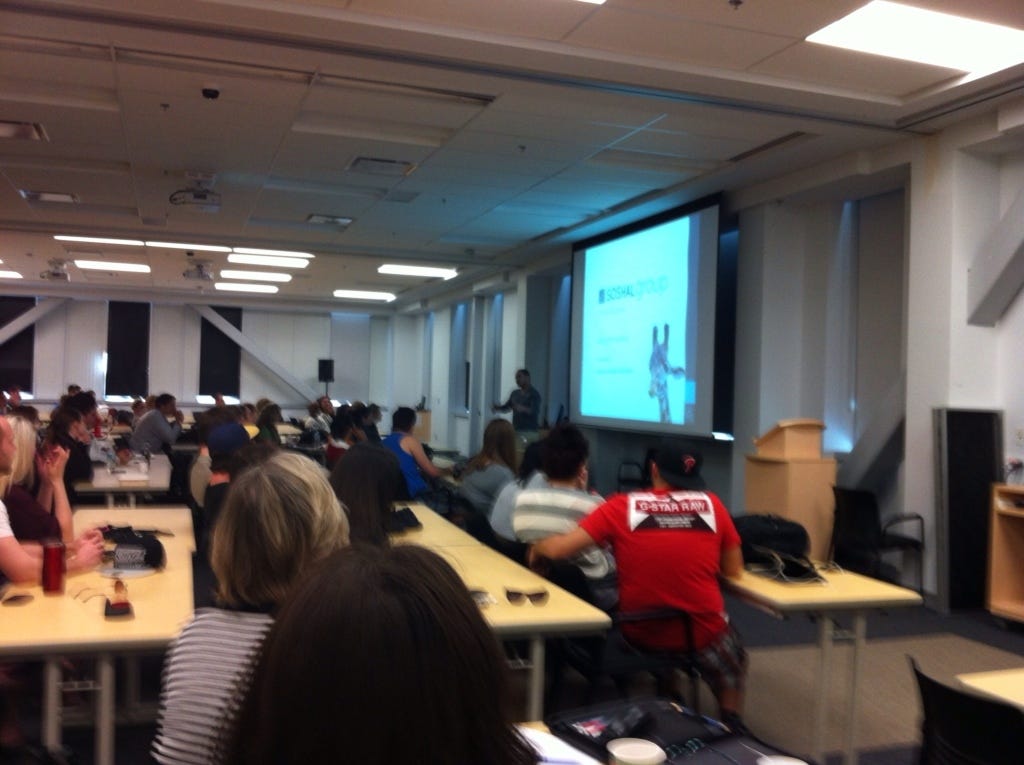The Myth of Distraction in the Classroom

Back when I was in school, I remember the teacher telling us to take out a note book and a pen, and face forward and pay attention. There we were, twitchy teenagers, forced to have laser-like focus on every word the teacher said (or read). There was time for questions at the end.
Inevitably, my mind would wander. I’d be thinking about everything but what the teacher was droning on about. I’d doodle instead of paying attention. I’d pass secret notes to my friends. I’d glance frequently at the clock, impatiently waiting for the bell to ring. When it did…freedom!
This was my experience at school about 90% of the time.
Flash forward to 2012, and now, most students no longer take notes on paper…they use tablets, laptops and even smart phones.
Except we still, for the most part, don’t allow these devices in class.
Yesterday, I was pleased to be sharing the bill with my pal Dave Hale, one of the brightest young guys I know. We were speaking to the 2012 graduating class in the Business Marketing program at Algonquin College about social media strategy. When Dave took the stage after my talk, the first thing he asked the students was why they didn’t have their devices out on the desk. “You should be taking notes on your laptops”, he said, “You could be tweeting this session to your friends! You can look up some of the sites I’m going to talk about!”
I could feel the teachers in the room shifting in their seats uncomfortably. Did he just tell them to use their phones? Go on their laptops? But…we spend so much time telling students NOT to use these devices in class! They are too distracting. If they are on their iPad they won’t be paying attention to my lecture! And I HAVE to cover this material with them! It’s on the final exam!
Distraction-free learning is a myth.
Often people of my generation and older will make the assumption that young people these days are too distracted. They are constantly texting, emailing, and surfing Facebook while watching TV and talking on the phone and playing video games, all at the same time. They have an inability to focus on a single task and as a result, they are failing to learn. Grades are suffering and attendance is at an all time low, and many teachers are blaming text messages and Facebook.
But students’ failure to learn isn’t about distraction at all. Unlike us, their brains are wired for the connected world. Whereas old folks like us have had to learn how to cope with new technology, these young people have been exposed to it their whole Iives. They are conditioned for connection.
Distraction isn’t the problem.
The problem is that kids these days are wired differently, and we are still trying to teach them using old methods. Three hour lectures are no longer effective (I’d argue they never were that effective). You can’t force someone to sit perfectly still and listen while you PowerPoint them half to death. Nobody is learning with that method.
We can’t just “cover material” anymore. Shoving bullet points and monotone monologues and book chapters at students results in a classroom of disengaged, bored, and ultimately failing and non-attending students. Asking them to regurgitate material they have supposedly “learned” through this method only teaches them how to regurgitate information.
Give them an experience, not a lecture.
We have to take a good hard look at how students these days are learning. In order to be successful, we must stop teaching retention of facts, and start focusing on mastery.
This means embracing the way students’ brains are now conditioned, and accepting that their brains are different from ours. It means using that very technology you think they are so distracted by to show them ways to use it to learn, and not just learn, but do and try and experiment and explore with it. It means no longer building lesson plans around “covering material”, and instead developing creative ways to give students a positive, supportive environment in which to learn.
Distraction isn’t the enemy of the classroom. Irrelevance is.


